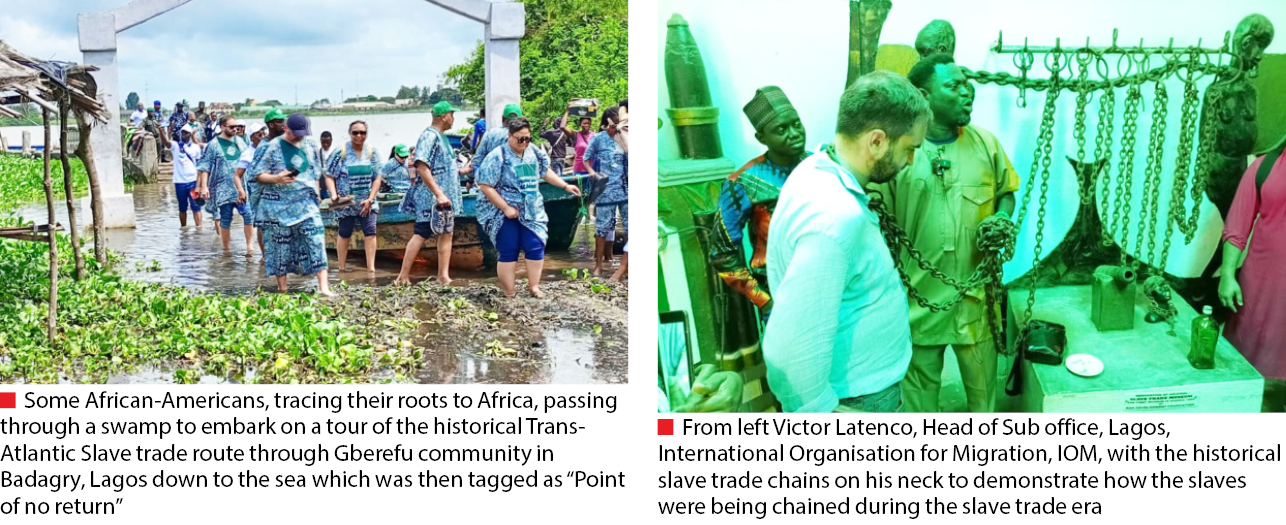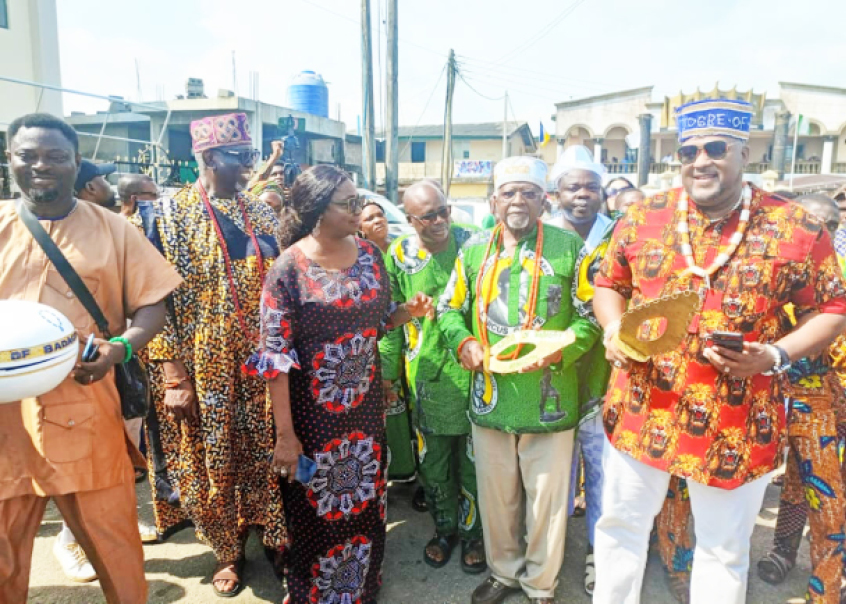Exactly four years after the last Door of Return Festival in Badagry, the organisers once again rolled out the drums to celebrate the 4th edition of the festival which evoked memories of centuries of Trans-Atlantic Slave Trade in the ancient city of Badagry in Lagos State, Daily Trust Saturday reports.
The festival was witnessed by several African-Americans who stormed the ancient historical city of Badagry and embarked on a tour of the Trans-Atlantic Slave Route to trace their roots.
Though the slave trade happened centuries ago and as sad and traumatic as the story remains, it would remain a reference point in telling African stories and how the continent has evolved over centuries ago.
The Door of Return Festival, put together by the Nigerians in Diaspora Commission (NIDCOM) with the support of the Lagos State Government, rekindled the memories of the Slave Trade, the evils associated with the trade and the gravity of man’s inhumanity to man which the Trans-Atlantic Slave Trade represented.
Appointments: Shut the door against desperate lobbyists, Col. Dangiwa tells Tinubu
Door of return: Rekindling memories of Trans-Atlantic Slave Trade
Africa and Nigeria in particular experienced centuries of Trans-Atlantic Slave Trade which involved the transportation of slaves captured or sold out to Slave traders through the Atlantic Ocean.
Slave traders mainly from America, Portugal, Brazil and European countries were historically known to ship their captured slaves out of Africa and Nigeria especially.
Till today, Badagry is full of relics of the Trans-Atlantic Slave trade which happened from the 16th to the 19th centuries.
So, the organisers could not have chosen a better and more fitting setting for the festival in their bid to spotlight the tragedy of the Trans-Atlantic Slave Trade, expose man’s inhumanity to man and the dehumanisation suffered by the progenitors of the African descent in the hands of the slave traders.
Many African-Americans, including the popular Dr Julius Garvey, son of the legendary Marcus Garvey, were on ground to tour the routes where captured slaves were taken through to the point of no return in the Atlantic Ocean. Also, Dr David Anderson, who is the founder and President of the BridgeLeader Network (BLN), and led the African-Americans to the 2019 festival, was also present this time around. Anderson was conferred the Jogbe (Returner) of Badagry during the last festival where he unveiled plans to build a Royal palace which would serve as unification and attraction to all the people in Diaspora with African descent.
Also, Queen mother Delois Blakely, Community Mayor of Harlem, New York City, USA, as well as Victor Latenco, Head of Sub office, Lagos, International Organisation for Migration, IOM.
The festival therefore was an appreciation of the resilience, tenacity, the strong-spirited courage of Africans to stand firm and steadfast, emerging some of the best in the world in spite of the trauma of not only the Trans-Atlantic Slavery but colonisation.
Lagos Governor, Babajide Sanwo-Olu, said Africa deserves to be compensated by the European nations for the pains and trauma of slavery.

The governor, who was represented at the grand finale of the event by the Secretary to the state government, Bimbola Salu-Hundeyin, emphasised that the challenge of slavery had not dissuaded the black man from waxing stronger.
He said, “I welcome our brothers from the diaspora led by Dr Julius Garvey. We are glad that you are back home. We welcome you to Badagry, we welcome you to Lagos. We celebrate the resilience, enterprise of the black man.
“After centuries of Trans-Atlantic slave exploitation, we are happy to see African descendants who are back and described it as a new dawn of renewed hope and freedom. Your welcome is symbolic!
“In technology, creative arts, music, entertainment, the black man is recognized. We thank God that our past has not put us in the past. We have built nations; we are committed to building a better world.”
Sanwo-Olu vowed to realise the construction of Diaspora Palace in Badagry.
“We are going to provide land where a diaspora palace would be built, where every son and daughter of Africa will have a room to themselves, bringing your wealth of experience to bear on your return home,” Sanwo-Olu added.
Dr Julius Garvey, son of legendary Marcus Garvey, was one of the new faces at the festival leading the pack of the African-Americans who attended the festival to trace their roots.
He was given a new name by the Akran of Badagry during the festival.
He is now called “Ajigo” of Badagry Kingdom which means the Child returns home.
Dr Garvey spoke on how the festival had rekindled the memories of the horrific Slave trade.
He expressed happiness over the joy of return, adding that it was indeed a long-awaited home-coming. He also promised to remain connected with Badagry.
His Royal Majesty De Wheno Aholu-Menu-Toyi1, the Akran of Badagry, who played host to the visitors and installed new title holders from among the African-Americans, also highlighted the significance of the festival.
On her part, the Chairman, Nigerians in Diaspora Commission, Abike Dabiri-Erewa, disclosed that the festival started in 2017 to celebrate the identity, culture, history, heritage and tradition of a given people in a given destination, usually in the primordial homeland at a given period.
She said some of the returnees were coming for the first time and they have indicated interest to invest in Nigeria and build Diaspora Palace in Badagry.
She added, “The Festival aggregates the tangible and intangible cultural resources as expressed in the history, artifacts, monuments, places of memory, religion, topographical attraction and environmental ambiance of the homeland as an instigator for homeland nostalgia or pull factors for the diaspora temporal or permanent return.”
She further stressed the need for collaboration between the private sector and the government.
Anago Osho, the tour guide, took the visitors through the various historical sites relating to the Slave trade before ending at the Point of No Return. Now renamed the Door of Return, the point of no return was across the Gerefu-Badagry village which leads straight to the Atlantic Ocean.
The visitors walked barefooted in memories of their forefathers all chained like animals, while being led to the waiting ship. Along the route was an ancient well where the captured slaves drank from on their way to board the ship. The Point of No Return symbolised that any slave who got to that point should forget about homes. Such a slave was either shipped to Europe or killed on the way as a result of tiredness or resistance of the Slave Traders.
This was why the visitors could not help but be emotional, imagining the trauma, the pain and agony their forefathers went through. Some prayed at the Point of No Return near the Atlantic Ocean.
Other sites visited include the Barracoon of Seriki Williams which has two cells where male and female slaves were separately kept for several days tied down in chains before the movement to the sea.
They also visited other historical sites and monuments revealing the true perspectives of the Trans-Atlantic Slave trade.
First point of call was the Seat of the British Canon donated to King Aholu Wawu of Badagry in 1843.
The delegation was also at the Mobee Family Museum Relics, depicting the height of man’s inhumanity to man through the Trans-Atlantic Slave trade.
At the Lagos State Heritage Museum, it was a sad recollection of a horrendous pictorial presentation of the evils of slavery.
Day 2 of the Badagry Door of Return Festival ended with a heart rendering theatrical enactment of the boisterous African continent, blessed with rich flora and fauna, demonstrating the dastardly consequences of slavery, the renaissance and renewed hope of the historic African Diaspora reconnecting with homeland.
Another African-American returnee, Mr Rabbi Kohain Halevi, said his experience at the festival was exciting though filled with joy and emotion.
Halevi said returning home from diaspora is a thing of joy for him and others, adding “the coming is spiritual, nostalgic, emotional and I am happy to be home.”
“The event needs more publicity for other sons and daughters of Africa in the diaspora to know that such a thing is taking place in Nigeria, and they are invited. It’s a spiritual pilgrimage they need to take because for many years African-Americans have been separated from their brothers and sisters back home.
“We have about three hundred and fifty million people of African origin that have been displaced by slave trade, so many of them come from this area. It is important for them to know that a festival like this takes place in Nigeria. More dissemination of information would help a lot.”
He also said it has been long overdue to ask for compensation from the Europeans and the Americans who enslaved Africa.
“The west has become rich from the exploitation of Africa and Africans and even the continent, the people must be compensated, there is no argument about that.”
For the participants, the experience of the Door of Return Festival was an eye opener and a reminder of the past which would ensure a better understanding of the past with a view to work towards a freer and more liberal society.

 Join Daily Trust WhatsApp Community For Quick Access To News and Happenings Around You.
Join Daily Trust WhatsApp Community For Quick Access To News and Happenings Around You.